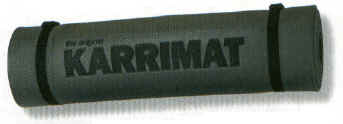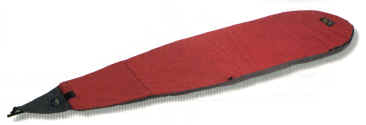
Sleeping mats on test
Stars in your eyes
By James Carron
Sometimes when you're camping out in the wilds, head poking from the tent as you stare up at the stars, there's a secret prayer formulating itself somewhere deep within your subconscious - 'Please God, send a helicopter with a lovely, big, plump Silentnight mattress hanging beneath it'. But it never arrives...
After a hard day in the hills, there's nothing worse than a fraught night of fidgeting as you try to manoeuvre yourself into a comfortable sleeping position. Eventually you find it, but by the time you do it's 6am and soon time to get up.
Over recent years great strides have been made in camping comfort. In days of old, hardened mountain men would curl up under a rock, a bed of heather and yellowing Daily Records beneath them. Then came the inflatable lilo. It weighed a ton and once it knew you were safely off in the land of nod it would invariably deflate, leaving your back as stiff as a board come dawn.
Next there was the foam mat and for a time outdoor folk thought that was as good as it got. Now, however, if you've got the cash, you can invest it in a self-inflating sleep mat.

Invented in 1971, Therm-a-Rest (pictured right) was the world's first self-inflating mattress. These lightweight mats offer an extremely comfortable night's sleep and I was an instant convert, having spent many years kipping out on my bright yellow foam mat which has since been cut up for my dog to sleep on (although he prefers the Therm-a-Rest too!).
You take the mat from its storage sack, unroll it and let it inflate - although a few puffs into the nozzle are usually required to help it on its way. When you're done with it, you simply twist the nozzle open and roll it up, squeezing out the air as you go.
The range is pretty extensive, but pricewise they're expensive.
The Standard long model is 38mm thick when inflated, 183cm long and weighs 1.1kg. There's a three-quarter length version (119cm long) which is more suited to weight conscious backpackers. It weights 710gms and is perfect for shorter people who don't mind their feet dangling over the edge. They cost £60 and £50 respectively. Both are sheathed in dirt and moisture resistant nylon.
For those with more cash to splash, the Performance UltraLite is worth considering. The three-quarter length model is Therm-a-Rest's lightest model at 450gms (£55) while the long one is 680gms (£65). Both are 25mm thick and offer a very good comfort to weight ratio.
So far I haven't suffered the indignity of a puncture but a repair kit is available, priced at £3.99.

At the traditional end of the market are Karrimor's popular Karrimats (pictured right). They come in a range of sizes at a variety of prices. They are made from abrasion and flex-resistant foam and are sold with webbing straps to keep them in a roll when you're on the move.
The Expedition model, which is 8.5mm thick, is suitable for year round use and costs just under £20. For those venturing out for a night under canvas during the winter, the more expensive Extreme, at '29.99, is 12mm thick, offering more comfort and insulation for sleeping on ice or snow.
They're bulkier than the self-inflating mats, but are light in weight and £considerably cheaper. Ground insulation is good but they're just not as comfortable.
A range of budget mats is available from outlets such as Field and Trek and the Famous Army Stores chain. F&T's Trek Mat offers good value for two to three-season camping at £9.99, while their Fell Mat, at £4.99, is fine for occasional summer use.

Mountain Hardwear has a range of sleeping mats suitable for everything from low-level summer camping to high level overnight stays in extreme conditions. They are made from a two-layer laminate of open and closed cell foam, enclosed within a removable outer, and all roll up into a lightweight package with attached fastenings to hold them shut. The Trail Head Mat is available in two lengths - 72 and 77 inches, weighing 1.2kg and 1.7kg respectively. They're heavy by comparison to others but provide extra padding for longer expeditions where comfort is a top priority. They cost £40 and £55.
The much lighter High Mountain model (pictured above) weighs only 772gms, the streamlined body shape removing weight and bulk. The 20mm thickness is ideal for cold weather use and the price is good at £30.
I'd certainly recommend the Therm-a-Rest for regular backpackers who are looking for a comfortable night's sleep, combined with low weight and a good compact packing size. The price is high, but worth it in the long run. The Mountain Hardwear products are extremely comfortable too, but a bit bulkier and heavier. Both are worth considering if you spend a lot of time camping out.
For those who make just occasional forays into the world of wild camping, a foam mat is probably all you'll ever need. They're cheap, virtually indestructible and are comfortable enough and provide a good level of ground insulation.
Contacts
Therm-a-Rest: www.thermarest.com
Mountain Hardwear: www.mountainhardwear.com
Karrimor: Tel 01254 893100
Field & Trek: www.field-trek.co.uk